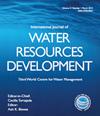Net positive and its application to water management
IF 2.2
3区 环境科学与生态学
Q3 WATER RESOURCES
International Journal of Water Resources Development
Pub Date : 2022-08-23
DOI:10.1080/07900627.2022.2110265
引用次数: 1
Abstract
Recently, Paul Polman, who was the chief executive officer (CEO) of Unilever (one of the world’s biggest multinational companies) between 2009 and 2019, and Andrew Winston, a specialist on sustainable business, wrote Net Positive: How Courageous Companies Thrive by Giving More Than They Take (2021). This highly readable book provides a new and more appropriate framework for business, eschewing decades of dogma, which was aptly summed up by Milton Friedman (who received the 1976 Nobel Memorial Prize in economic sciences) as ‘there is one and only one social responsibility of business – to use its resources and engage in activities designed to increase its profits ...’ (Friedman, 1962, p.133). For the most part, Friedman’s philosophy was accepted by businesses for some 50 years. Even now, many CEOs of large to small business companies have held this view, either explicitly or implicitly. We have known Polman for several years. He is one of the most unorthodox, charismatic and out-of-the-box thinkers we have ever encountered. Not surprisingly, The Financial Times of London has described him as a ‘standout CEO of the past decade’. He and his co-author have written not ‘a utopian fantasy’ but have cogently and persuasively argued for a new mindset from the business leaders to ensure ‘the scale of change and transformation the world so desperately needs’. This mindset will meet the twin essential objectives of making the world a better place to live in and also to produce decent returns for the shareholders of companies. The authors define a ‘net positive’ company as one that ‘improves well-being for everyone it impacts and at all scales – every product, every operation, every region and country, and for every stakeholder, including employees, suppliers and communities, customers, and even future generations and the planet itself’ (Polman & Winston, 2021, p.7). It is an ambitious goal that, to our knowledge, no company in the world has achieved completely. However, a most positive recent development has been that numerous companies all over the world have started on such journeys. The authors provide numerous examples from the performance of Unilever when it started its Unilever Sustainable Living Plan (USLP) in 2010. This plan made purpose and enriching others’ lives as the core to Unilever’s business philosophy. Among its aggressive goals were doubling sales while cutting its environmental footprint in half and helping one billion people to improve their health and well-being. The authors refreshingly accept that the USLP journey has not been easy, and ‘Unilever has plenty of war wounds and mistakes to point to’. Equally, Unilever has accomplished a great deal. For example, for 11 straight years, it was ranked as the number one sustainable company in the world. In fact, during Polman’s captaincy, it was the ‘gold standard’ to which CEOs of nearly all other major companies aspired to. Interestingly, INTERNATIONAL JOURNAL OF WATER RESOURCES DEVELOPMENT 2022, VOL. 38, NO. 5, 737–741 https://doi.org/10.1080/07900627.2022.2110265净正性及其在水管理中的应用
最近,曾在2009年至2019年期间担任联合利华(世界上最大的跨国公司之一)首席执行官的保罗·波尔曼和可持续商业专家安德鲁·温斯顿共同撰写了《净积极:勇敢的公司如何通过给予而不是索取而茁壮成长》(2021年)。这本极具可读性的书为商业提供了一个新的、更合适的框架,避开了几十年来的教条,这些教条被米尔顿·弗里德曼(1976年诺贝尔经济学奖得主)恰当地总结为“企业有且只有一种社会责任——利用其资源并参与旨在增加利润的活动……(Friedman, 1962年,第133页)。在很大程度上,弗里德曼的哲学被商界接受了大约50年。即使是现在,许多大大小小的企业的首席执行官都或明或暗地持有这种观点。我们认识波尔曼好几年了。他是我们所见过的最不正统、最有魅力、最不墨守成规的思想家之一。毫不奇怪,伦敦《金融时报》称他为“过去十年中最杰出的首席执行官”。他和他的合著者所写的并不是“乌托邦式的幻想”,而是令人信服且有说服力的,为商业领袖们提出了一种新的思维方式,以确保“世界迫切需要的变革和转型的规模”。这种心态将满足两个基本目标:让世界变得更美好,并为公司股东带来可观的回报。作者将“净积极”公司定义为“在所有规模上改善其影响的每个人的福祉-每种产品,每次运营,每个地区和国家,以及每个利益相关者,包括员工,供应商和社区,客户,甚至后代和地球本身”(Polman & Winston, 2021,第7页)。这是一个雄心勃勃的目标,据我们所知,世界上没有一家公司完全实现了这一目标。然而,最近一个最积极的发展是,世界各地的许多公司已经开始了这样的旅程。作者提供了联合利华在2010年启动其联合利华可持续生活计划(USLP)时的表现的许多例子。这个计划将目标和丰富他人的生活作为联合利华经营理念的核心。其雄心勃勃的目标包括:销售额翻一番的同时,将其对环境的影响减少一半,并帮助10亿人改善健康和福祉。两位作者令人耳目一新地承认,联合利华的发展历程并不容易,“联合利华有很多战争创伤和错误需要指出”。同样,联合利华也取得了巨大的成就。例如,它连续11年被评为世界上最可持续发展的公司。事实上,在波尔曼担任首席执行官期间,这是几乎所有其他大公司的首席执行官都渴望达到的“黄金标准”。《国际水利开发学报》,2022年,第38卷,第2期。5,737 - 741 https://doi.org/10.1080/07900627.2022.2110265
本文章由计算机程序翻译,如有差异,请以英文原文为准。
求助全文
约1分钟内获得全文
求助全文
来源期刊
CiteScore
8.10
自引率
9.70%
发文量
23
审稿时长
1 months
期刊介绍:
International Journal of Water Resources Development is a policy and practice-oriented Journal that covers all aspects of water resources policy, management, development and governance. It is an interdisciplinary journal that focuses on water resources and their economic, financial, social and environmental-related impacts. Contributions which include the interdependences and inter-linkages between the water and the agricultural, energy, industrial and health sectors in both developed and developing countries, both at present and in the future, are welcome.

 求助内容:
求助内容: 应助结果提醒方式:
应助结果提醒方式:


